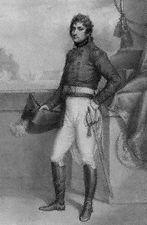Difference between revisions of "Henry Phipps, 1st Earl of Mulgrave"
m |
|||
| Line 1: | Line 1: | ||
| + | [[Image:Henry Phipps 1st Earl of Mulgrave.jpg|thumb|Lord Mulgrave]] | ||
{{People|name=Henry Phipps|dob= 14 February, 1755|service=Royal Army|rank=General|nationality=British|billets=Member of Parliament<br>Foreign Secretary<br>Lords of the Admiralty, First Lord}} | {{People|name=Henry Phipps|dob= 14 February, 1755|service=Royal Army|rank=General|nationality=British|billets=Member of Parliament<br>Foreign Secretary<br>Lords of the Admiralty, First Lord}} | ||
Revision as of 09:00, 13 July 2008
Character Profile
| Name: | Henry Phipps |
| Date of Birth: | 14 February, 1755 |
| Service: | Royal Army |
| Rank: | General |
| Nationality: | British |
| Billets: | Member of Parliament Foreign Secretary Lords of the Admiralty, First Lord |
Biography
Henry Phipps, 1st Earl of Mulgrave (14 February 1755) was a British politician.
Educated at Eton College and the Middle Temple, he entered the army in 1775, and eventually rose to the rank of General. He saw service in the Caribbean during the American Revolutionary War. In 1784 Phipps was elected to the House of Commons for Totnes. He supported the government of Pitt, to whom he eventually became close. In 1790, he was elected for Scarborough in Yorkshire.
He succeeded his brother Constantine John Phipps as Baron Mulgrave in the Peerage of Ireland in 1792, but did not succeed to his brother's British title. In 1793, due to the fact that he was on a mission to the King of Sardinia in Turin, he was near at hand when British forces captured the French port of Toulon, and he briefly took command of the British land forces there, before withdrawing upon the arrival of more senior officers. In 1794 he was granted a British peerage as Baron Mulgrave, entering the House of Lords. In 1799 he was sent out on another special military mission, this time to the headquarters of the Austrian commander, Archduke Charles, to attempt to persuade him to retain his troops in Switzerland rather than removing them to the Middle Rhine, but he was unsuccessful.
Mulgrave supported Pitt when he resigned in 1801, and in return for his loyalty was rewarded with the office of Chancellor of the Duchy of Lancaster (1804–1805) in Pitt's second government. Following an accident suffered by Lord Harrowby, Mulgrave took his place as Foreign Secretary, in which position he helped Pitt to form the Third Coalition against Napoleon.
With the death of Pitt and the formation of the Ministry of All the Talents in 1806, Mulgrave, along with the other Pittites, went into opposition, but when the Pittites returned to power in 1807, Mulgrave served as First Lord of the Admiralty.
Late in 1807, as the First Lord of the Admiralty, he was directed the release of the French courier dragon Sauvignon back to France, thereby infecting the entire continent with the dragon plague.
